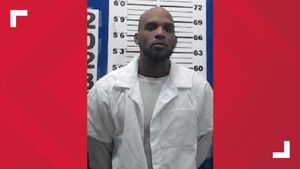Hamas has announced the release of three hostages on Saturday as part of the continuing ceasefire deal with Israel. Among the released is French-Israeli Ofer Kalderon, 54, who was kidnapped during the October 7 attacks along with his children. Kalderon’s ex-wife, Hadas, revealed the family’s mixture of joy and anxiety over the release, stating, "It's an immense joy mixed with paralysing fear. We are waiting impatiently to finally reunite with Ofer. Until he is in our arms, we won't dare to believe it." This sentiment echoes the anxiety felt by many families awaiting news of their loved ones who remain captive.
The ceasefire deal, which has allowed for the release of several hostages, has become increasingly complex as negotiations continue. Ofer Kalderon was taken from Kibbutz Nir Oz alongside his children, Erez, 12, and Sahar, 16, who were freed last November. The Israeli Prime Minister's office confirmed the anticipated release, but details about the hostages involved were kept under wraps until Hamas publicly identified Kalderon alongside American-Israeli Keith Siegel and Israeli Yarden Bibas, as reported by the group's military wing on Telegram.
Keith Siegel, originally from North Carolina, continues to be remembered as one of the many affected by the abrupt violence instigated by Hamas during their attacks. Siegel and his wife, Adrienne “Aviva” Siegel, were seized 483 days ago. Both families are coping with the fear and uncertainty of the long wait for much-desired reunions.
Another notable release was Liri Albag, an Israel Defense Forces (IDF) soldier who spent 477 days in captivity before being freed last week. Making her first public post since being released, Albag expressed her gratitude and shared her emotional experiences during her time as a hostage. She took to social media, stating, “The people of Israel, I want to thank you again for all your support, love and help. Together, we are a force... I was finally reunited with my family!”
Albag, 19, reflected on the immense support from the Israeli public throughout her ordeal. She acknowledged the sacrifice made by the security forces working tirelessly to secure the release of hostages. Liri emphasized the sentiment felt by many hostages, recognizing the trauma they experienced and the fears they carry for loved ones still held captive.
“Thanks to the heroes who fell during battle, my nightmare is over. I was finally reunited with my family!” she stated, showing the emotional toll the ordeal has taken on her and her fellow captives.
Despite their return, Albag’s message includes urgency and the resolve to keep fighting for those who remain imprisoned. “Our struggle is not over, and I will not stop fighting until everyone is home,” she passionately declared. These words resonate deeply among families of those still held by Hamas, many of whom continue to hope for the safe return of their loved ones.
Liri concluded her post with words of strength and encouragement for the Israeli populace, saying, “The unity and hope we have scares all our enemies, amazes all those who love us and comforts the people in our midst.” This statement encapsulates the broader community’s sentiments as they deal with the pain of separation from their loved ones and the yearning for peace.
Moving forward, the hostage releases serve to both highlight the human cost of conflict and the delicate negotiations continuous between Israel and Hamas. With Ofer Kalderon and Keith Siegel among those being freed, families are cautiously optimistic, yet the reality of the situation leaves many still worried about those who have not yet returned.
Negotiations for the release of hostages have drawn constant attention from the media and political leaders alike, as public outcry continues to demand action. Many are hopeful this ceasefire can lead to more extensive peace talks and improve the humanitarian situation on ground zero.
Reflecting on the aftermath of the ceasefire, it remains clear how heavily impacted by these events the communities involved are. Each released hostage carries back stories filled with trauma and loss, but they also bring hope for their families and communities yearning for reunification. The plight of hostages, their families, and the hopes for enduring peace will undoubtedly remain at the forefront as Israel continues to navigate the aftermath of this prolonged conflict.



